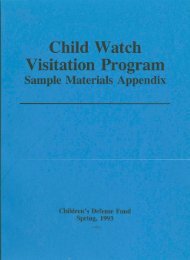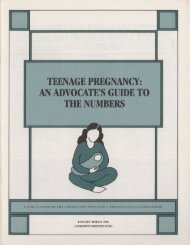child care - Digital Library Collections
child care - Digital Library Collections
child care - Digital Library Collections
Create successful ePaper yourself
Turn your PDF publications into a flip-book with our unique Google optimized e-Paper software.
THE STATE OF AMERICA'S CHILDREN YEARBOOK 1998<br />
Box 1.1<br />
W.lfare TI... LI..Its: State Ch.lces (continued)<br />
• 60 months: Alabama, Alaska, Colorado, District ofColumbia, Hawaii, Iowa, Kansas, Kentucky,<br />
Maine, Maryland, Minnesota, Mississippi, Montana, New Hampshire, New Jersey, North<br />
Dakota, Oklahoma, Pennsylvania, South Dakota, Washington, West Virginia, Wisconsin, and<br />
Wyoming set unrestricted 60-month lifetime limits. California and Rhode Island reduce but do<br />
not terminate benefits after 60 months. New York's Safety Net program helps families who lose<br />
benefits after 60 months. Michigan and Vermont set no time limits but require work after a<br />
specified period.<br />
Every state plans to exempt some families (federal TANF dollars may be used to exempt up to<br />
20 percent of the caseload from the 6Q-month time limit). Exemptions commonly cover families<br />
with an adult who has a disability, is over age 60, or is caring for a dependent with a disability;<br />
families experiencing domestic violence; and minor parents complying with school and living<br />
arrangement requirements.<br />
The Center for Law and Social Policy and the Center on Budget and Policy Priorities provided help in assembling<br />
this list.<br />
has made the time limit far more harsh by keeping<br />
the clock ticking even when families begin to work.<br />
The months those families continue to receive<br />
Medicaid are counted toward their state's 24<br />
month lifetime limit, even though they are not receiving<br />
any cash assistance. A family who finds<br />
low-paid work and needs Medicaid coverage for<br />
two years will find itself ineligible for further aid if<br />
the parent should become unemployed. Advocates<br />
in Indiana are fighting the state over this interpretation<br />
of the law.<br />
Work requirements. The 1996 federal welfare<br />
law requires that within 24 months of receiving<br />
TANF, parents or <strong>care</strong>givers engage either in work<br />
(subsidized or unsubsidized) or in related activities<br />
such as job search, community service, on-the-job<br />
training, or a maximum 12 months of vocational<br />
training. Many forms of education or training do<br />
not count toward the law's fust 20 hours per week<br />
of required work, and amendments to the law<br />
passed in the 1997 Balanced Budget Act made the<br />
education provisions even more restrictive.<br />
Whereas the original law limited vocational train-<br />
ing to 20 percent of the entire adult caseload, now<br />
only 30 percent of those participating in work activities<br />
are eligible for such training. For many welfare<br />
recipients who had hoped their education or<br />
training would lead to better <strong>care</strong>ers and long-term<br />
self-sufficiency, the restrictions mean setting aside<br />
their studies to take low-paying jobs.<br />
The federal work participation requirement is<br />
30 percent of all TANF single parents in Fiscal<br />
Year (FY) 1998, rising to 50 percent in FY 2002<br />
and beyond. Seventy-five percent of two-parent<br />
families must have one parent engaged in work<br />
now, rising to 90 percent in FY 1999 and thereafter.<br />
It is expected that most states will meet the<br />
work participation rates for single-parent families,<br />
at least in the first year or two, but that states are<br />
likely to have trouble fulfilling the two-parent family<br />
requirements. States that fail to meet the participation<br />
rates will lose some of their fede~al TANF<br />
block grant dollars.<br />
The federal Fair Labor Standards Act and<br />
other worker protection laws require that parents<br />
working off their grants (but not those pursuing<br />
education or training) must be paid at the equiva-<br />
10 CHI L D R EN'S DE FEN S E FUN D














